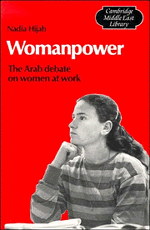Crossref Citations
This Book has been
cited by the following publications. This list is generated based on data provided by Crossref.
Compton, Anita Y.
1989.
Multicultural Perspectives on Sex Education.
Sexual and Marital Therapy,
Vol. 4,
Issue. 1,
p.
75.
Kandiyoti, Deniz
1991.
Women, Islam and the State.
p.
1.
Badran, Margot
1991.
Women, Islam and the State.
p.
201.
Papps, Ivy
1992.
Women, work and Weil‐being in the Middle East: An outline of the relevant literature.
Journal of Development Studies,
Vol. 28,
Issue. 4,
p.
595.
Carré, O.
1992.
Agenda d'apres‐guerres en orient arabe.
International Review of Sociology,
Vol. 3,
Issue. 3,
p.
43.
Afshar, Haleh
1992.
Women and Adjustment Policies in the Third World.
p.
205.
Longva, Anh Nga
1993.
Kuwaiti Women at a Crossroads: Privileged Development and the Constraints of Ethnic Stratification.
International Journal of Middle East Studies,
Vol. 25,
Issue. 3,
p.
443.
1993.
SELECT BIBLIOGRAPHY.
Middle East Policy,
Vol. 2,
Issue. 1,
p.
154.
Maclean, Sandra J
Yap, Nonita T
El‐Doufani, Mohamed M
Thomas, Jim
Gills, Barry K
Chant, Sylvia
Ramsey, Russ
Chant, Sylvia
Afshar, Haleh
and
Afrasiabi, Kaveh L.
1994.
Book reviews.
Third World Quarterly,
Vol. 15,
Issue. 1,
p.
157.
Forey, A.J.
Harvey, L.P.
Shoshan, Boaz
Levtzion, Nehemia
Fuccaro, Nelida
Afshar, Haleh
Wise, Renate
Booth, Marilyn
Ikeda, Misako
Piterberg, Gabriel
Dodd, C.H.
Hale, William
Dodd, C.H.
Watson, Janet
Dickins, James
Abu‐Haidar, Farida
and
Starkey, Paul
1994.
A. reviews: general.
British Journal of Middle Eastern Studies,
Vol. 21,
Issue. 1,
p.
115.
Bernal, Victoria
1994.
Gender, Culture, and Capitalism: Women and the Remaking of Islamic “Tradition” in a Sudanese Village.
Comparative Studies in Society and History,
Vol. 36,
Issue. 1,
p.
36.
Vikør, Knut S.
Yapp, M.E.
Rogan, Eugene
Nielsen, J.S.
Leaman, Oliver
Peerwani, Latimah S.
Lawrence, Bruce B.
Galford, Hugh S.
Latham, J. Derek
Schmidt, Jan
Rafeq, Abdul‐Karim
Norton, Augustus Richard
Clark, Janine A.
Booth, Marilyn
Lewis, Norman N.
Hopwood, Derek
Smith, Charles D.
Abu‐Manneh, Butrus
Budeiri, Musa
Hinnebusch, Raymond A.
Brunnhuber, Ulrich H.
Schilcher, L.S.
Rathmell, Andrew
McDowall, David
Clark, Peter
Adams, Michael
Kapchan, Deborah A.
Pennell, C.R.
Abir, Mordechai
McBeath, N.
Murden, Simon
Afshar, Haleh
Kunt, I. Metin
Quataert, Donald
Incirlioğlu, Emine Onaran
Borthwick, Bruce
Cortese, Delia
Waines, David
Montgomery, James E.
Khawam, René R.
Kilias, Doris
Abu‐Haidar, Farida
Irwin, Robert
and
Hillenbrand, Robert
1995.
B: Reviews: general.
British Journal of Middle Eastern Studies,
Vol. 22,
Issue. 1-2,
p.
135.
Fernea, Elizabeth
1995.
Ways of seeing middle eastern women.
Women: A Cultural Review,
Vol. 6,
Issue. 1,
p.
60.
Afshar, Haleh
1995.
Why fundamentalism? Iranian women and their support for Islam.
Women: A Cultural Review,
Vol. 6,
Issue. 1,
p.
18.
Mohamad, Maznah
1998.
Feminism and Islamic Family Law Reforms in Malaysia: How Much and to What Extent?.
Asian Journal of Women's Studies,
Vol. 4,
Issue. 1,
p.
8.
Cairoli, M. Laetitia
1998.
Factory as Home and Family: Female Workers in the Moroccan Garment Industry.
Human Organization,
Vol. 57,
Issue. 2,
p.
181.
Shaham, Ron
1999.
State, feminists and Islamists—the debate over stipulations in marriage contracts in Egypt.
Bulletin of the School of Oriental and African Studies,
Vol. 62,
Issue. 3,
p.
462.
Hefner, Robert W.
2000.
The New Cambridge History of Islam.
Welchman, Lynn
2000.
The New Cambridge History of Islam.
p.
411.
Arabsheibani, G. Reza
and
Manfor, Lamine
2002.
From Farashia to Military Uniform: Male‐Female Wage Differentials in Libya.
Economic Development and Cultural Change,
Vol. 50,
Issue. 4,
p.
1007.



